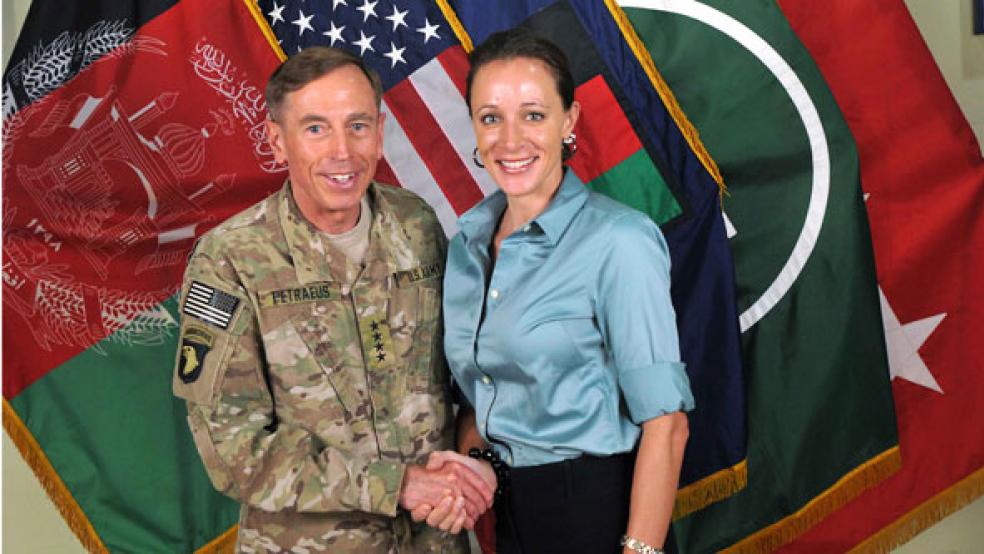A week after winning a second term, President Barack Obama faces a widening scandal within his national security team that complicates plans to reshape his Cabinet and could reverberate through decisions on the war in Afghanistan, the fight against al Qaeda and efforts to prevent Iran from getting a nuclear bomb.
The White House sought on Tuesday to limit the fallout from an FBI probe that led to the resignation of CIA director David Petraeus because of an extramarital affair, and now involves General John Allen, the top U.S. commander in Afghanistan. U.S. defense officials are looking into a series of "flirtatious" emails Allen sent to a woman at the center of the Petraeus case.

White House spokesman Jay Carney rejected the notion that the scandal could undermine Americans' safety. He said Obama had confidence in Allen to continue "ably" commanding U.S. forces in Afghanistan while the investigation proceeds and expressed faith in the CIA's acting director, Michael Morell. Obama "has confidence in the military to carry out the various missions that he has asked them to carry out," Carney said.
Even so, the scandal - which comes as Obama already was preparing to fill other key vacancies in his national security team - makes for an embarrassing sendoff to the president's first post-election trip abroad, a three-nation Southeast Asia tour starting this weekend. In an attempt to stabilize his national security team and get the scandal behind him, Obama may decide to accelerate key personnel moves that could ripple through his administration.
RELATED: Guess What Tops Obama's New To-Do List?
He must pick a successor for departing Secretary of State Hillary Clinton. Massachusetts Senator John Kerry, U.N. Ambassador Susan Rice and national security adviser Tom Donilon are among those likely to get consideration. Defense Secretary Leon Panetta has long been rumored to be leaving; among those mentioned as possible replacements are Kerry, Panetta's deputy Ashton Carter, and Michele Flournoy, who was Panetta's policy chief before stepping down this year. Flournoy would become the first woman to serve as America's defense chief.
Petraeus' CIA job is now open. Morell, now the acting CIA director, is likely to be a top contender for the permanent job along with John Brennan, the White House's chief counter-terrorism adviser. And if Allen's now-frozen nomination to be the top NATO commander in Europe is nixed, that could ripple through the military's hierarchy.
Quick changes could be risky, especially at a pivotal time for the troubled Afghan war effort. But they also could give Obama a chance to get fresh eyes on foreign policy and national security issues that are likely to be significant parts of his presidential legacy. "It's a ‘Rubik's Cube' of decisions to make on who sits where, and figuring out the solution is getting more complicated," said Peter Feaver, a political scientist at Duke University.
THE SCANDAL TAKES A TURN
The latest twist came on Tuesday, when it was revealed Allen was under investigation for alleged "inappropriate communication" with Jill Kelley, the Tampa, Florida, woman whose complaint about harassing emails from Petraeus biographer Paula Broadwell led the FBI to uncover the affair between Broadwell and Petraeus.
The Allen revelation threatens to fell another of the military's biggest names and suggests the controversy involving Petraeus - a retired four-star general who had Allen's job in Afghanistan before moving to the CIA last year - was far from over. Obama put on hold Allen's nomination for the coveted NATO post, for which he had been expected to win easy confirmation by the Senate.
The cloud over Allen's future comes at a key moment for winding down U.S. involvement in the unpopular war in Afghanistan.
Allen had been expected to take a lead role in making the case to Obama in coming weeks on how many troops to keep in Afghanistan as part of a residual force after the drawdown of most combat forces by the end of 2014. Commanders on the ground are widely known to favor keeping a larger contingent behind than many of Obama's aides support. In addition to affecting the military, the scandal has implications on how much flexibility Obama will have in shuffling chairs in his national security and diplomatic apparatus.
Before his fall, Petraeus had been due to testify at closed-door congressional inquiries this week into the attack on the U.S. consulate in Benghazi, on September 11, when Ambassador Christopher Stevens was killed. Republicans, in the final weeks of the presidential campaign, had accused the administration of not providing enough security to the consulate and then mishandling the aftermath of the incident. Petraeus, who had long been admired on both sides of the political aisle, might have been able to lend credibility to the administration's account of what happened.
His testimony as CIA chief also might have helped Rice, a front-runner to succeed Clinton as secretary of state. If he is ordered to testify anyway, Petraeus' appearance would be an awkward moment for the administration. Rice had been singled out by Republicans as a misleading voice for the administration in the early days after the Benghazi attack, as officials initially wrestled with the question of whether al Qaeda operatives were involved. Rice and the administration first said the attack appeared to be a response to a YouTube video that offended Muslims; later the White House acknowledged al Qaeda's involvement.
The last thing Obama, fresh from his re-election victory over Republican Mitt Romney, wanted to do was head overseas with his national security team in disarray. Some Asian leaders already are skeptical of U.S. military commitment as part of a strategic "pivot" toward the economically dynamic region to counter an increasingly assertive China. They are looking for reassurance that fiscal problems in Washington won't impinge on that strategy.
"It's bad optics for what might otherwise have been a victory lap for the president," said Feaver, a former National Security Council official in the administrations of Democrat Bill Clinton and Republican George W. Bush. Asked whether the scandal was an unwelcome distraction for Obama so soon after his re-election, Carney told reporters: "I certainly wouldn't call it welcome."
THE STAKES ARE HIGH James Carafano, a war historian with the conservative Heritage Foundation think tank in Washington, said Obama would have to move quickly to find a permanent replacement for Petraeus. CIA data analysis is crucial to Obama's decisions on a wide range of security matters, including determining how close Iran is to achieving nuclear weapons capability and whether al Qaeda is making progress in regrouping in places such as North Africa and Yemen. "These are matters of war and peace," Carafano said. "The information the president receives and the relationship he must have with a CIA chief is so important that you can't go long without a director." This article was reported and written by Matt Spetalnick of Reuters.
The uncertainty surrounding Obama's national security team also comes at a time when the defense establishment is on edge over impending deep spending cuts that will hit the military as well as social programs at year-end if the Democratic president and Republicans in Congress fail to avert a looming "fiscal cliff."



